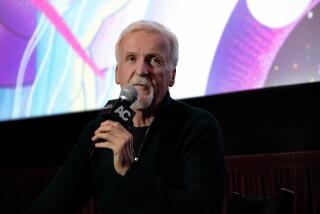Review: ‘Deep’ follows free divers to plumb oceans’ depths
- Share via
Journalist and adventure junkie James Nestor surfed at the Arctic Circle two years before he came across competitive freediving — plunging hundreds of feet into the ocean on a single breath without scuba gear. On assignment for Outdoor magazine in 2011, he set up to witness the sport in the waters offshore Kalamata, Greece.
“What I will see next will confound and terrify me,” he writes in the time-honored manner of P.T. Barnum. The reader may well draw a skeptical breath before entering Nestor’s third book: “Deep: Freediving, Renegade Science, and What the Ocean Tells Us About Ourselves.”
Still, the trip is worth making. Freediving fascinates, and Nestor uses vivid, visual prose, a sense of humor and a fat travel allowance to introduce readers to its customs, habitués and scenery.
The opening episode in the Mediterranean is ghastly: “I watch several more competitors attempt dives to around three hundred feet. Many can’t make it and turn back. They resurface with blood running down their faces from their noses, unconscious, or in cardiac arrest. The competition just keeps going on. And, somehow, this sport is legal.”
Nestor can’t see much below the surface, but officials are watching on sonar as Nestor sends his readers along: “The pressure at three hundred feet down is more than ten times that of the surface, strong enough to crush a Coke can. At thirty feet, the lungs collapse to half their normal size; at three hundred feet, they shrink to the size of two baseballs.”
Humans can manage this feat because of the mammalian dive reflex. Nestor, whose first book was “Get High Now (Without Drugs),” prefers calling it by a goofier phrase: “Master Switch of Life.” Once our faces hit cold water, humans undergo nifty physiological changes that protect our organs at great pressures without oxygen. Pearl and sponge divers have used this reflex for centuries.
But Nestor is so gob-smacked by the successful, Zen-like diving in Greece of New Zealander William Trubridge that he rather endearingly phones his mother in California. “It’s impossible,” she declares. Clearly the author and his mom were innocent of a 2010 video, watched by more than 18.5 million YouTube viewers, in which the French athlete Guillaume Nery free dives in the Bahamas on one four-minute breath.
Our intrepid author determines to follow Trubridge into the sea.
It doesn’t go well. “Deep” is charming partly because Nestor, who insinuates himself from first page to last, is good company. He has a devil of a time equalizing his ears. “Whenever I felt the pressure of deep water below twenty feet, I’d immediately imagine the blacked-out faces of the divers I saw in Greece,” he writes. “Those dead eyes and bloated necks were powerful images — some of the most gruesome I’d ever seen.”
The book is built out of the struts of two magazine stories, the initial Outside article and a Men’s Journal piece called “The Shark Whisperer,” about a free diver on Reunion Island in the remote Pacific bent on tagging sharks. The idea was to communicate their predatory movements in real time to surfers and swimmers via smartphone aps.
Nestor is crisp with his fun, seafaring facts; he is sober with his sprinkling of environmental bulletins. The book never preaches, and it’s a zippy read. Compared to the blissful quiet of freediving, he notes, scuba diving is “like I’ve gone bird watching with a leaf blower strapped to my back.” But Nestor hasn’t much of a head for the rigors of science — woo-woo notions about communicating with whales via holograms have little in common with double-blind, placebo controlled studies. One of his jaunts is a “freediving sperm whale-research expedition” off Sri Lanka that the journalist himself organizes.
Instead, “Deep” is a romantic, urgent gesture. He argues for the value of the non-expert, that his colorful gallery of rogue investigators “have clocked more hours with the inhabitants of the ocean’s depths than anyone before them.” Nestor’s decision to tag along lets his readers, vicariously, get wet.
“Jane Goodall,” he writes, “didn’t study apes from a plane.”
Long manages the Anisfield-Wolf Book Awards for the Cleveland Foundation.
Deep
Freediving, Renegade Science, and What the Ocean Tells Us About Ourselves
James Nestor
Houghton Mifflin Harcourt, 272 pp., $27
More to Read
Sign up for our Book Club newsletter
Get the latest news, events and more from the Los Angeles Times Book Club, and help us get L.A. reading and talking.
You may occasionally receive promotional content from the Los Angeles Times.










